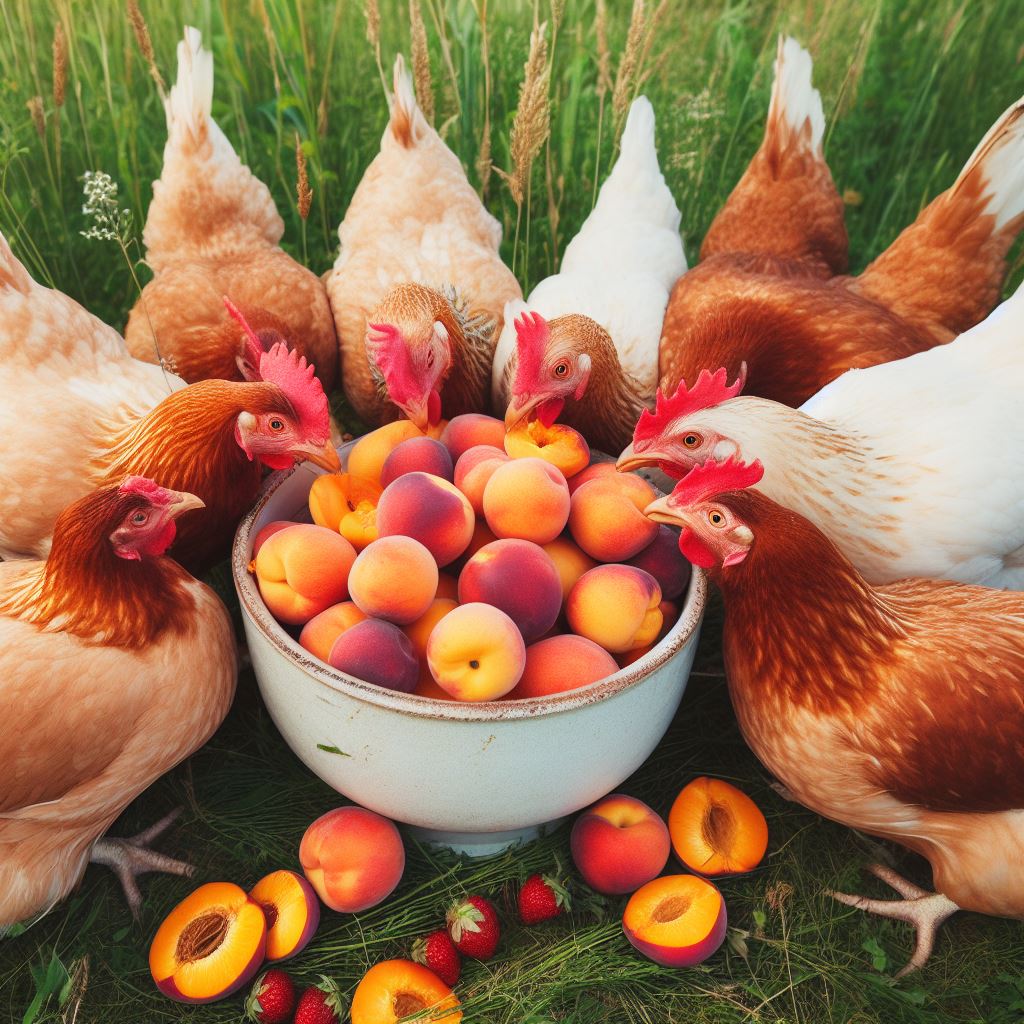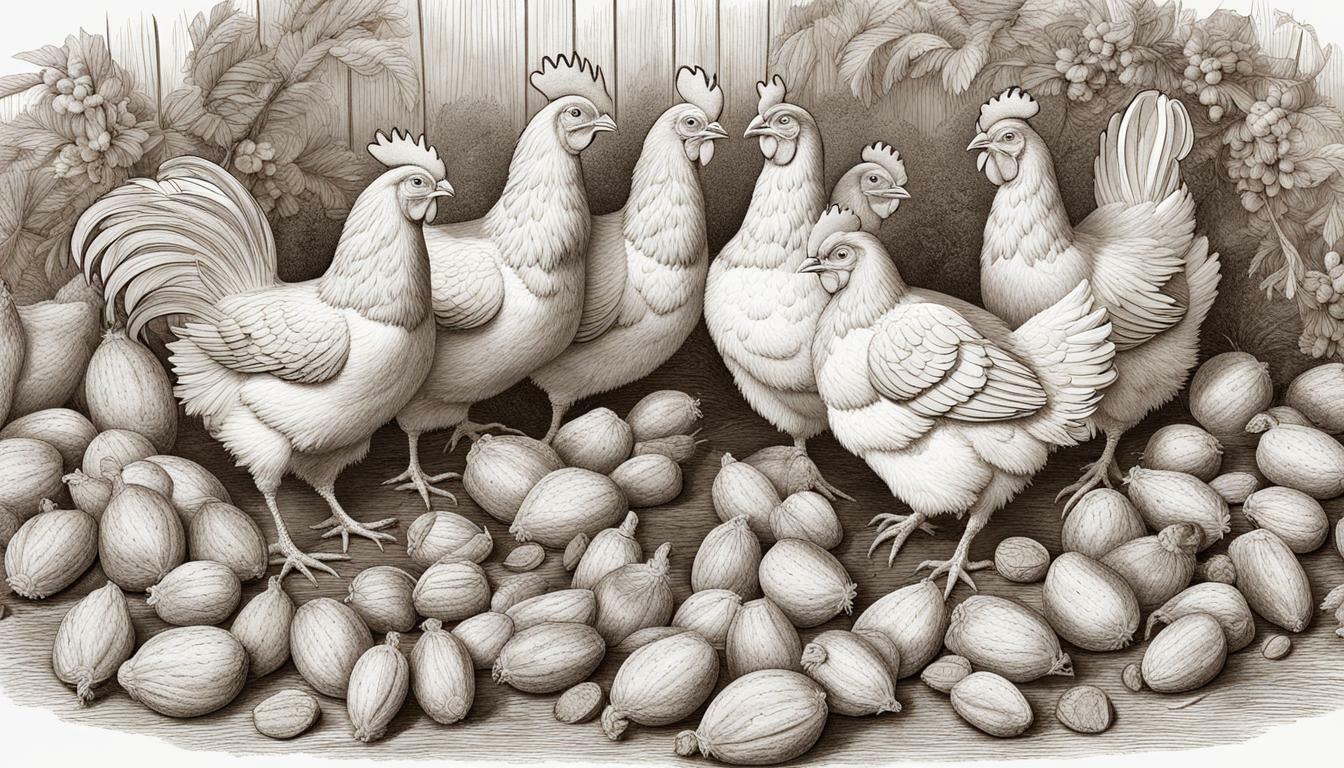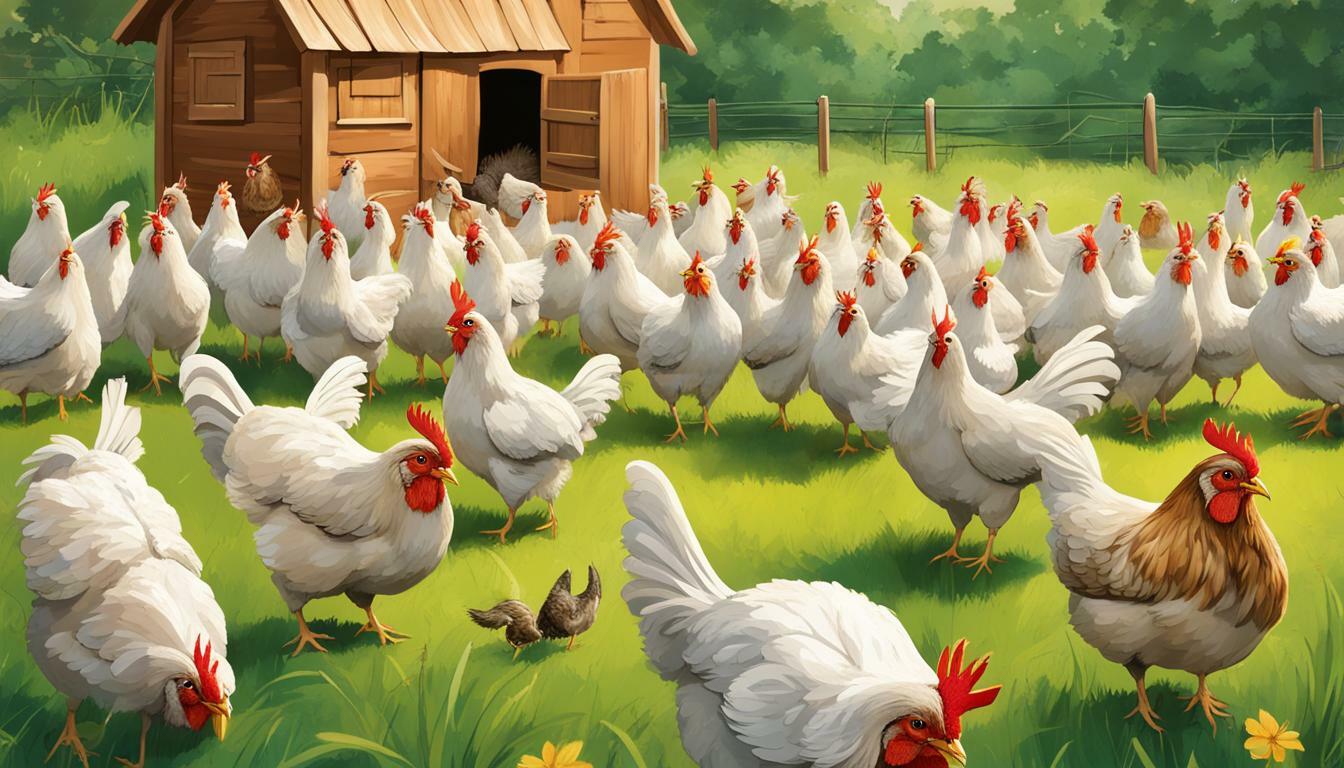Can Chickens Eat Nectarines? Discover the Answer Today!

Table of content:
- The Key Nutritional Needs of Chickens
- Nectarines for Chickens: Health Benefits and Nutritional Value
- Potential Risks of Feeding Nectarines to Chickens
- Introducing Nectarines to Your Flock: Best Practices and Precautions
- Other Fruits Suitable for Chickens’ Consumption
- Maintaining a Balanced Diet for Your Chickens
- Conclusion
As a responsible chicken owner, it’s essential to provide your feathered friends with a well-rounded diet that meets their nutritional needs. Chickens require a balanced intake of protein, carbohydrates, fat, vitamins, and minerals to maintain good health, grow strong, and produce high-quality eggs.
The Key Nutritional Needs of Chickens
Protein is a crucial component of a chicken’s diet, as it is necessary for muscle development, feather growth, and egg production. The ideal protein ratio for chickens is around 16%, which can be found in poultry feed or through other sources such as mealworms or soybeans.
Carbohydrates provide energy to chickens, and they can be found in a range of grains, seeds, and fruits such as corn, wheat, and apples. Good sources of fat include seeds, nuts, and oils, which can be added to the diet in moderation.
Chickens also require a range of vitamins and minerals to maintain good health. Calcium is essential for strong eggshells and can be found in sources such as oyster shells, limestone, or eggshells. Other essential vitamins and minerals include vitamin A, vitamin D, vitamin E, iron, and selenium, which can be found in a balanced poultry feed or other supplements.
Nectarines for Chickens: Health Benefits and Nutritional Value
When it comes to feeding your chickens, fruits such as nectarines can offer several health benefits. These sweet and juicy fruits are a great source of vitamins, minerals, and antioxidants that can help keep your birds healthy and happy.
Nectarines are a rich source of vitamin C, which is essential for a chicken’s immune system. They also contain vitamin A, which promotes good eyesight and skin health. Additionally, nectarines are a good source of fiber, which can improve digestion and prevent constipation in chickens.
In terms of minerals, nectarines are a good source of potassium, which can help regulate blood pressure and maintain heart health in your birds. They also contain calcium, phosphorus, and magnesium, which are essential for strong bones and teeth.
Another benefit of nectarines is their antioxidant content. These fruits are rich in flavonoids and carotenoids, which can help protect your chickens from oxidative stress and inflammation. This, in turn, can help reduce the risk of various diseases and improve overall health.
However, it’s important to remember that nectarines should always be fed in moderation. While they offer many benefits, excessive consumption can lead to digestive issues such as diarrhea or vomiting. It is recommended to give your chickens small amounts of nectarines as a treat, rather than as a significant portion of their daily diet.
Potential Risks of Feeding Nectarines to Chickens
While nectarines are safe for chickens to consume in moderation, there are still potential risks to consider when introducing this fruit to their diet. The following are some of the most significant risks:
- Overfeeding: Excessive nectarine consumption can cause digestive problems, leading to diarrhea or gastrointestinal distress. It’s crucial to feed nectarines in moderation, offering them as a treat rather than a staple food source.
- Choking Hazard: The pit of the nectarine can pose a choking hazard for chickens. It’s essential to remove the pit and chop the fruit into small, manageable pieces to avoid choking.
- Moldy Fruit: Nectarines that are moldy or rotten can be dangerous for chickens to consume, potentially leading to illness or death. Always make sure to inspect fruit before feeding it to your flock to avoid any potential health risks.
Overall, while there are potential risks associated with feeding nectarines to chickens, these can be easily avoided by practicing moderation and following best practices.
Introducing Nectarines to Your Flock: Best Practices and Precautions
If you’ve decided to incorporate nectarines into your chicken’s diet, there are a few essential guidelines and precautions to follow. Below are some best practices for feeding nectarines to your feathered friends:
- Introduce nectarines gradually: Start by feeding small amounts of nectarines as a treat and gradually increase the quantity over time. This will help prevent any digestive issues that may arise from sudden changes in their diet.
- Only feed fresh fruit: Always use fresh nectarines and avoid feeding them canned or processed fruits, as they contain preservatives that are harmful to chickens.
- Wash nectarines thoroughly: Before feeding nectarines to your flock, be sure to wash them thoroughly with clean water to remove any dirt, debris, or pesticides.
- Remove the pit: Nectarine pits contain cyanide, which is toxic to chickens. Be sure to remove the pits before feeding the fruit to your flock.
- Monitor your chickens: Watch your chickens closely after feeding them nectarines to ensure they don’t experience any adverse reactions. If you notice any digestive problems, discontinue feeding them nectarines.
By following these best practices, you can safely introduce nectarines to your chicken’s diet and provide them with a healthy treat.
Other Fruits Suitable for Chickens’ Consumption
While nectarines can be a healthy addition to your chicken’s diet, there are several other fruits that you can incorporate into their meals for added nutrition and variety.
Berries
Berries, such as strawberries, blueberries, raspberries, and blackberries, are all safe for chickens to eat. These fruits are packed with antioxidants and vitamins that can help promote a healthy immune system.
Apples
Apples are a popular treat for chickens and can be an excellent source of fiber and vitamins for them. Be sure to cut the apples into small pieces and remove the seeds, as they contain traces of cyanide that can be toxic to your chickens.
Bananas
Bananas are another safe fruit for chickens and are a good source of potassium and vitamins B and C. Mash a ripe banana and mix it in with their feed for a tasty and healthy treat.
Watermelon
Watermelon is a refreshing summer treat that chickens love. It’s also an excellent source of hydration and contains vitamins A, B6, and C. Be sure to remove the seeds before feeding it to your chickens, as they can pose a choking hazard.
Remember to introduce new fruits gradually and in small quantities to avoid upsetting your chicken’s digestive system. Feeding your chickens a variety of fruits, in addition to a balanced diet, can help keep them happy, healthy, and well-fed.
Maintaining a Balanced Diet for Your Chickens
When it comes to your chickens’ diet, it’s essential to provide them with a well-rounded and balanced meal plan. This means incorporating a variety of essential nutrients and vitamins, along with suitable treats like fruits. Here are some tips for maintaining a balanced diet for your chickens:
- Ensure your chickens have access to clean, fresh water at all times.
- Provide a high-quality chicken feed that meets all of their nutritional needs. You can consult with a poultry nutritionist or your local feed supplier to determine the best feed for your flock.
- Incorporate a variety of foods into your chickens’ diet, including grains, vegetables, and fruits. This will help ensure they receive all of the essential nutrients they need to thrive.
- Offer treats like fruits in moderation, as too many can upset your chickens’ stomachs or cause them to become overweight.
By maintaining a balanced diet for your chickens, you can help ensure their overall health and well-being. Remember to consult with a poultry nutritionist or veterinarian if you have any questions or concerns about your chickens’ diet.
Conclusion
In conclusion, you now know that chickens can safely consume nectarines and that doing so in moderation can offer several health benefits. However, it’s crucial to consider the potential risks and follow best practices when introducing nectarines, or any other fruit, to your flock.
Remember that a balanced diet is essential for your chickens, and it’s crucial to provide them with the necessary nutrients for their overall health and well-being. Incorporating fruits like nectarines and other essential nutrients into their diet can help ensure that your flock stays happy and healthy.
By following the guidelines and tips discussed in this article, you can confidently introduce nectarines or other fruits to your chickens’ diet, while keeping their safety and nutritional needs in mind. With a bit of care and attention, you can keep your feathered friends healthy, well-fed, and flourishing.
Welcome. I’m Adreena Shanum, the proud owner of this website, and I am incredibly passionate about animals, especially poultry. I founded adreenapets.com as a labor of love, stemming from my desire to share my knowledge and experiences with poultry enthusiasts worldwide.





